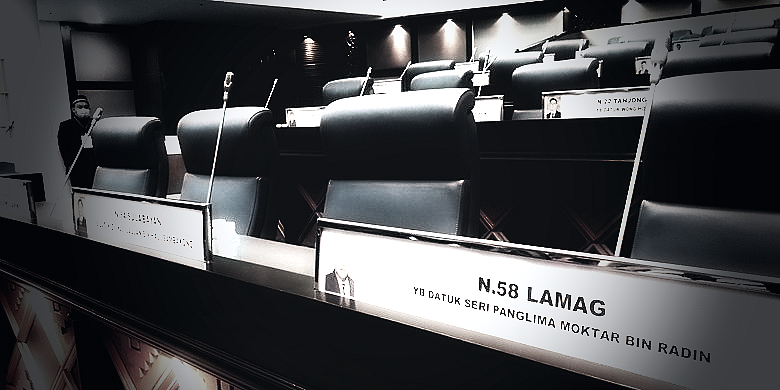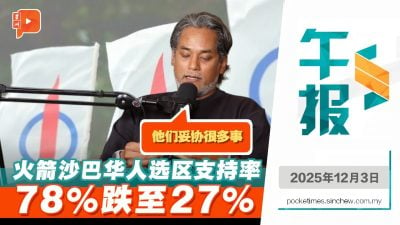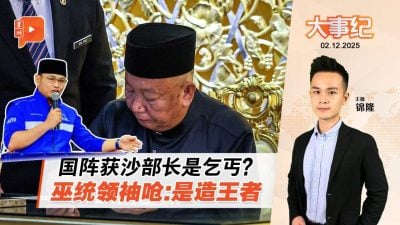Sabah has long been known as the notorious playground of political frogs.
Hajiji Noor has for the time being defused a coup d’état crisis threatening his state administration, but Bung Moktar, Shafie Apdal et al are not going to concede defeat this soon, and no one can rule out the possibility of them plotting a second coup to wrestle the state administration.
Even the federal government is in a precarious position today, and it is our hope that the power-grabbing maneuvers will not extend to the other states.
It is also hoped that Sabah will eventually free itself from falling into the storm of the country’s political storm and that all the endless struggles can be put to a conclusive stop right away.
The composition of the Sabah state government is highly intricate, not unlike what we have in our parliament today.
It was rumored last week that the Sabah state administration could change hands any time. Deputy chief minister cum Sabah BN chairman Bung Moktar declared in a press conference to withdraw his support for incumbent CM Hajiji Noor.
If all the 18 Umno state reps (of all 79 state seats) were to withdraw their support for Hajiji in favor of Shafie Apdal, then the GRS state government would indeed collapse.
If not for the gravity of the incident, PM Anwar Ibrahim would not have skipped home after his maiden Indonesian visit to rush to Sabah for mediation.
To Anwar and Ahmad Zahid, what they want least is for the state government to fall and fresh election called, for fear the fire of renewed political tussle and redistribution of power could spread to Putrajaya.
Anwar’s stand is largely consistent with Ahmad Zahid’s: Sabah needs a cooling period before a unity government can be formed.
In our parliament today, the unity government is made up of all parties and alliances other than Perikatan Nasional (Bersatu and PAS). Anwar has proposed that Hajiji work with Bung Moktar (Umno) and Shafie (Warisan) who have agreed with the PM that a unity state government could stabilize the political situation in the state.
The thing is, the fire was started by Bung Moktar, but with five of the 18 Umno assemblymen not supportive and PH’s seven representatives refusing to be part of a “backdoor government,” the state Umno chief’s plan has officially failed, and he may have to be forced to support a “unity government” in hope of getting a place in it.

Unfortunately, as Hajiji now has secured the support of 44 assemblymen, he will not want to form a unity government that includes also Bung Moktar and his gang.
The CM is jumping into action real fast; a cabinet reshuffle was announced on Wednesday. The incumbent deputy CM and works minister Bung Moktar is banished from the state government, along with his “accomplices” Jafry Ariffin and Yakub Khan. As if that’s not enough, the seats of these people have all been moved to the opposition side.
In the cabinet reshuffle, PH and Umno assemblymen supporting the CM get rewarded. Umno’s state minister Shahelmey Yahya gets promoted to deputy CM and works minister; PH’s Christina Liew is tourism, culture and environment minister; and Ginger Phoon is industrial development minister.
Those getting promoted include also James Ratib and Joachim Gunsalam, while the incumbent assistant finance minister Masidi Manjun is now the minister. Hajiji also sets a precedent for a chief minister not doubling as finance minister.
We can see from the cabinet reshuffle that Hajiji has no intention of alienating Sabah BN; he only wants to work with people whom he can work with. This is the “unity government” à la Hajiji Noor.
Anwar has proposed a unity government for Sabah given the similarities between the state and federal governments.
With the state cabinet restructured, Bung Moktar’s coup has come to a temporary close, and the state is saved from yet another election for the time being.
We have to admit that democratic politics can be achieved by not just an election. When no party is strong enough to rule alone, perhaps it may need to reach a consensus with the other parties in order to put up a joint government that will implement policies that benefit the people.
Hajiji’s GRS alliance has a total of 29 state reps. If Bung Moktar had succeeded in getting all 18 Umno reps to withdraw their support for Hajiji, he will need to secure the support of additional 11 state assemblymen in order to stay in power with a simple majority of 40 seats.
Sabah has in the last few years sunk into the power-grabbing quagmire following the change of the federal administration. The state has long been known as the notorious playground of political frogs.
July 30, 2020, a large number of ruling assemblymen defected to the new alliance led by Musa Aman, forcing CM Shafie Apdal to seek the consent of the state governor to dissolve the state legislative assembly to pave way for fresh elections.
September 12, 2020, then prime minister cum PN chairman Muhyiddin Yassin formed the GRS to fight Shafie’s Warisan+. In the September 26 Sabah election, Muhyiddin’s PN, along with BN and PBS won with a simple majority, and Sabah Bersatu chairman Hajiji Noor became chief minister.
After the 15th general election on November 19, 2022, GRS joined PH, BN and GPS of Sarawak to form the “unity government” and supported Anwar Ibrahim as prime minister.
December 2022, due to the religious extremism of PN, Sabah Bersatu assemblymen under the leadership of GRS chief Hajiji quit Bersatu to become direct representatives of GRS, while kicking their former party out of the alliance.
ADVERTISEMENT
ADVERTISEMENT








































